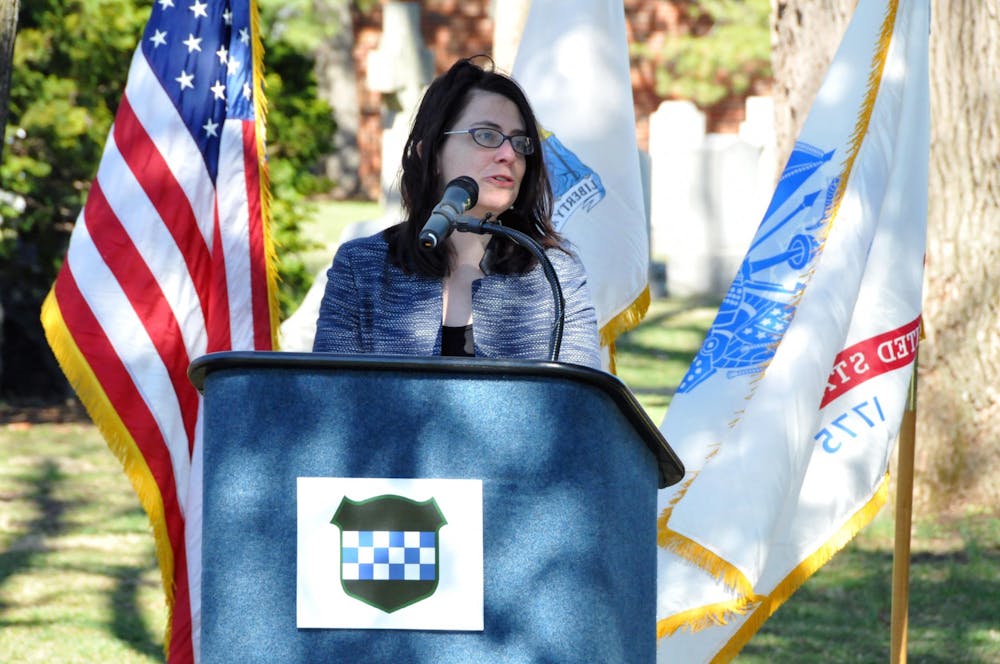Princeton Mayor Liz Lempert decried a new lawsuit by the Trump administration against a New Jersey policy limiting cooperation with federal immigration authorities and emphasized that Princeton’s policy has not changed.
“There’s an effort to instill fear in people, and it’s understandable why people are afraid. In part, creating confusion can lead to fear,” she said. “We try to be as clear as possible about what our policies are.”
On Feb. 10, the U.S. Department of Justice sued the state of New Jersey, Governor Phil Murphy, and Attorney General Gurbir Grewal over the state’s Immigrant Trust Directive. Enacted in 2018, the directive limits how much state, county, and local law enforcement officers can assist federal immigration authorities. Grewal has explained these rules were “designed to draw a clear distinction between local police and federal civil immigration authorities, ensuring that victims and witnesses feel safe reporting crimes to New Jersey’s law enforcement officers.”
The lawsuit questions the directive’s constitutionality.
“According to the complaint filed today, on multiple occasions last year, New Jersey officials failed to provide information regarding the release dates of aliens who had been charged with or convicted of crimes,” notes a Justice Department press release. “New Jersey’s decision to obstruct federal immigration enforcement by refusing to provide such information is unlawful under the Supremacy Clause of the U.S. Constitution.”
Lempert, in an interview with The Daily Princetonian, called the Justice Department’s decision to sue “frustrating” and “totally counterproductive to what’s good for safe communities and effective law enforcement.”
“It’s important that people feel comfortable coming to the police,” she said. “You need that trust, and you need people to understand that if you’re the victim of a crime or the witness of a crime, your immigration status is immaterial.”
According to Lempert, Princeton had a similar policy in place years before Grewal’s directive, which superseded the town’s policy.

Princeton Police Chief Nicholas Sutter said the “spirit” of the policy remained the same. Sutter, who has worked in Princeton for 25 years, said he has worked on the issue of immigration for the majority of his career, long before it came to dominate the national conversation.
“We have proven through our actions that we’re here to help everyone regardless of their country of origin or immigration status,” Sutter said in an interview with the ‘Prince’. “I think we’ve proven that over and over again.”
One major portion of the directive criticized in the suit requires people in local custody to be notified if Immigration and Customs Enforcement, the federal agency, issues a detainer for them — a written request that local authorities hold them for an additional 48 hours to provide federal immigration authorities time to decide whether or not to take the individual into custody.
However, Lempert and Sutter explained that this doesn’t really apply to Princeton. The mayor noted that while Princeton does have a “holding cell,” the Police Department cannot keep people there for over a day, and Sutter said they “just don't get ICE detainers.”

Lempert’s main concern is that the lawsuit may undermine the bonds of trust that the local government has established with immigrants in Princeton.
“It’s important not just for police work, but for the community we want to have, where all residents who are here feel like the government is working for them,” she said. “And when the federal government makes that harder for us to do at a local level, it’s distressing.”
Coinciding with other Trump administration attacks on various so-called “sanctuary” policies, some view the lawsuit as a way for the administration to play to its base during an election year. Grewal called the move an “election year stunt,” and Murphy referred to the suit as an “attempt to vilify our immigrant communities for the sake of election year politics.”
Lempert agreed, saying she thinks the move is “part of a larger effort to go after immigrants and to divide the country.” She views the original directive as an effective law enforcement mechanism and thinks the opposition is coming from federal officials without a good sense of how local law enforcement operates.
“I think that’s why you see local police departments, local police chiefs, they were all very supportive of the Attorney General when he came out with this directive,” Lempert said. “Because they’re the people who are on the ground day-to-day.”
Kunal Parker, a historian of U.S. immigration and citizenship law and a fellow at the Princeton Program in Law and Public Affairs, said it is important to view this case in relation to past immigration-related disputes. He explained that the process of “line-drawing” between federal immigration power and state power has been essentially ongoing since the end of the Civil War.
But according to Parker, the Trump administration has recently pushed the line further into what might once have been seen straightforwardly as areas of state authority, claiming fuller and more unimpeded power over immigration issues.
While a great deal of jurisprudence on the issue of immigration exists, Parker said it is unclear how this case will play out in the courts.
“There is a lot of constitutional law,“ he noted. “It’s not exactly clear how the court will use that law to decide this issue.”
If the suit is successful, Lempert said, she would need more information before knowing exactly what the town would do. Princeton would likely try to maintain its current policy to the greatest extent possible, while still abiding by state and federal law, she said.
Lempert emphasized that the lawsuit is only just starting, and Princeton’s policy has not changed.
“I don’t want people to think that suddenly our policies have changed because of this lawsuit, because they haven’t,” she added.








